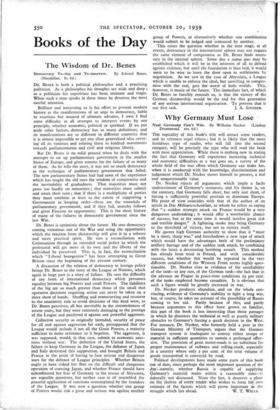Why Germany Must Lose
Tits topicality of this book's title will attract some readers, arid its triteness repel others ; but it is likely that the more fastidious type of reader, who will fall into the second category, will be precisely the type who will read the book with most appreciation. While there is nothing new in stating the fact that Germany will experience increasing technical and economic difficulties as a war goes on, a survey of the Whole field of the war effort which Germany can make has, when it is conducted with the knowledge, discrimination and judgement which Dr. Necker shows himself to possess, a real and unquestionable 'value.
- Dr. Necker rejects all arguments which imply a facile underestimate of Germany's resources; and his theme is, on the contrary, that Germany falls short, but only just short, of having a sufficiently powerful position to dominate Europe. His point of view coincides with that of the author of an article in Das Militanvochenblatt, to whom he refers as saying that "a sudden strategic attack on France would be a very dangerous undertaking ; it would offer a worthwhile chance of success, but at the same time it would involve great risk and terrible danger." A lightning stroke may bring Germany to the threshold of victory, but not to victory itself.
He quotes high German authority to show that it "must be a short, sharp war," and foreshadows a new type of attack which would have the advantages• bOth of the preliminary artillery barrage and of the sudden tank attack, by combining with the latter a devastating bombing assault. This method has already been tried in Poland, and with considerable success, but whether this would be repeated in the very different conditions of the Western Front seems highly ques- tiqnable. Dr. Necker cites as evidence of the unreliability of the tank—at any rate, of the German tank—the fact that in the advance on Prague in peace-time conditions 25 per cent. of the tanks employed become casualties. It is obvious that such a figure would be greatly increased in war.
Dr. Necker produces abundant, and on the whole con- vincing, evidence of Germany's inability to fight a long war, but, of course, he takes no account of the possibility of Russia coming to her aid. Partly because of this, and partly because arguments to this effect have grown so familial-, this part of the book is less interesting than those passages in which he discusses the technical as well as purely military obstacles to Germany's forcing a quick decision in the West. For instance, Dr. Necker, who formerly held a post in the German Ministry of Transport, argues that the German transport system is inadequate to convey either troops or material in sufficient quantities to sustain a prolonged offen- sive. The provision of great motor-roads is no substitute for proper maintenance of railways and rolling-stock, especially in a country where only 2 per cent. of the total volume of goods transported is conveyed by road.
Political developments have made some parts of this book out of date, since perhaps the most important question of the day—namely, whether Russia is capable of supplying Geimany's material wants within a reasonable time—is naturally not discussed. None the less, it deserves a place
on the shelves of etery reader who wishes to form hif own estimate of the factors which will prove important in the












































 Previous page
Previous page